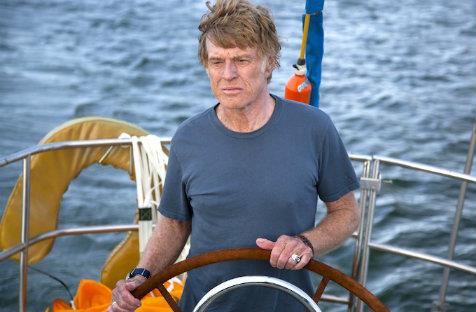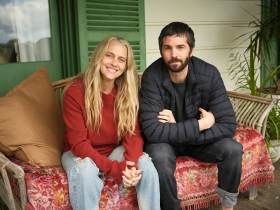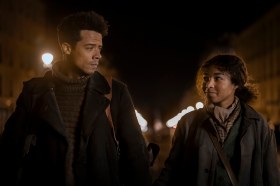After the dense, talky Margin Call, writer/director JC Chandor has pulled a complete 180° turn with his sophomore film, All Is Lost. Featuring almost no dialogue, this tightly wound, affectingly immersive survival film is uncompromising in its precise focus, and features an impressively physical performance from Robert Redford.
Redford stars as a character billed simply as ‘Our Man’, and the film opens with him seemingly on the verge of death, reciting a letter to his family. This is the only real dialogue in the entire film and the most information we’ll get regarding our protagonist’s back story. We flash back eight days and discover the catalysing moment for the tragedy. Our Man is 1700 miles offshore in the Indian Ocean when he is awoken one morning after a shipping container rips a hole in his yacht’s hull. Calmly responding to the situation with only mild frustration, we follow the slow process of him disengaging the container and patching the hole, but it seems a chain of events has been triggered that will lead to increasingly dire situations for our protagonist.
JC Chandor’s original screenplay was apparently only 30 pages long, and at its essence, All is Lost is a remarkably straight-forward film. Chandor studiously avoids any classical dramatic contrivance or cliché, keeping his film procedural with a sense of stark, documentary-like realism. Unlike other single-setting survival stories such as 127 Hours or Castaway, All is Lost boldly refuses to flesh out its central character, which ultimately works in the film’s strength. Redford’s performance becomes an almost cipher-like representation of the human survival instinct. He methodically approaches each calamity with a stoic sense of purpose and determination, turning the film into a viscerally existential experience.
Visually, Chandor keeps things simple, with cinematographer Frank De Marco generating a tactile and immersive sensibility. The camera almost never leaves the confines of the boat except for one particularly memorable shot from above late in the film.
Transitioning to a life raft half way through the film, things get even more claustrophobic. We are never offered the classically cathartic wide image showing us our character as a speck in the large open ocean. In fact the only times Chandor gives us some outward perspective on the raft occur from below the water, resulting in an ominous sense of the ocean as a tangible entity ready to swallow up Our Man at any moment.
This impression of nature encroaching upon the human domain is powerfully depicted in All is Lost. Each time Our Man resolves one calamity it seems nature raises yet another hurdle. One point, late in the film, Our Man almost catches a fish only to have a shark steal it off his line moments before he can get it on board. The sensation of dispiriting irony is almost comical but while the film may often feel hopeless it is certainly not without hope.
Robert Redford is amazing in what is essentially an incredibly blank performance. He never overplays his part but rather subtly conveys an increasing weariness.
All is Lost is a genuinely bold film. It’s not especially innovative but its commitment to its solipsistic core has a cumulative effect that is wrenchingly gripping. Chandor certainly demands his audience be patient and pay attention but he rewards them with an experience of pure cinema; an immersive, ascetic encounter that is simultaneously simple and sophisticated.
Rating: 4 ½ stars out of 5
All is Lost
Director: JC Chandor
USA, 2013, 100 minutes
Melbourne International Film Festival
www.miff.com.au
25 July – 11 August
Actors:
Director:
Format:
Country:
Release:





